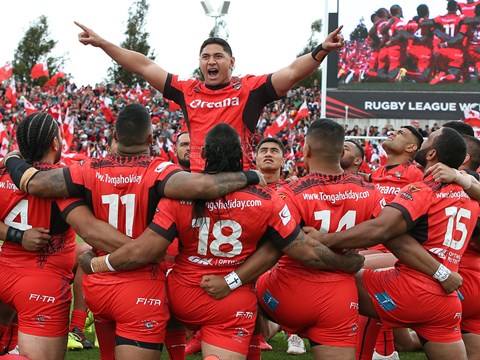
International rugby league has never been richer. The rise of Pacific nations at the Rugby League World Cup put the game on the map – outside of its traditional heartland.
From Fiji's hymns, to Tonga's and Samoa's hakas and the heart shown by Papua New Guinea. While Australia won the Cup, these island nations won the hearts of rugby league lovers.
The success of Jason Taumalolo's controversial decision to play for Tonga is paying immediate dividends; coach Kristian Woolf said Tongan youngsters now want to follow in his footsteps rather than follow their traditional dream of one day playing rugby union for the All Blacks.
Taumalolo stole the headlines in the lead-up to the World Cup when he turned his back on New Zealand to represent Tonga and he has inspired the next generation to choose league over union.
"Every single kid in Tonga … they all want to be Jason Taumalolo at the moment, they no longer want to be an All Black," Woolf said.
It's a powerful statement that shocked Australian Rugby League Commission chairman and Rugby League International Federation vice-chairman John Grant.
"Wow, that's a big call. That's really big," Grant said.
"On the back of that we should take advantage of it. No doubt about it and we should not squander the opportunity."
Many of the lasting moments from the World Cup featured the Pacific nations front and centre, and most people involved in rugby league would love to see more.
"We need to find a way to get games including Tonga and obviously New Zealand back in New Zealand," Woolf said.
"I think in time it has the ability to become an event like Origin.
"If you look at that game in Hamilton (against New Zealand in the World Cup), the atmosphere, the interest, the crowd … it needs to be a regular and it needs to be a regular as soon as we can get it happening. It has to be an annual thing."
The 2018 Pacific Test Invitational will be the next time traditional rivals Tonga and Samoa face off. Papua New Guinea and Lebanon will also do battle in Campbelltown on June 23.
Woolf fears the lack of international games could force Taumalolo to defect back to New Zealand.
"I can't even tell them – outside the Pacific Test – whether we've got anything to play for in the next three years," Woolf said.
"If he (Taumalolo) has to make a decision on whether he wants to commit to Tonga or not, what's he committing to?
"That's where the NRL and the international rugby league need to find a way that if they're fair dinkum about growing international footy, then that's what we need to be talking about."
The lack of opportunity for Pacific nations to play more regularly essentially comes back to one thing – money.
Canterbury Bulldogs star Will Hopoate represented Tonga for the first time in this year's Pacific Test, before he played a key role in their top-four finish in the World Cup.
The fullback fears Tongan players who are eligible for other nations could pledge their allegiance to the Kangaroos and Kiwis, due to the huge discrepancy in player payments.
"It makes it a hard decision because you're not in this career for a long time and we're preparing for the future to set up our families," Hopoate told NRL.com.
"If payments are equal … I think you'll begin to see players wanting to give back and play for their nation and their cultures.
"If we're doing the same thing then just make the pay the same.
"It's not just a hundred or a two-hundred-dollar difference, it's thousands of dollars that separates the gap between what tier one and what tier two (nations) are paid."
Grant supports the idea to close the gap but admits an agreement won't be reached in the foreseeable future.
"It needs goodwill to distribute it from the wealthy to the poorer," Grant said.
"The best thing about that is, the players who are paid the most – which is the Australian players – have voiced their willingness to talk about this. That's a big deal.
"This is something that needs to be capitalised on, because the home nations can't afford it, therefore, somehow 'the game' needs to afford it."
